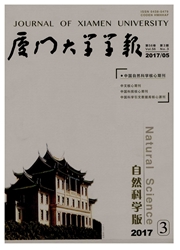

 中文摘要:
中文摘要:
针对纤维素的转化,以纤维二糖催化加氢制备山梨醇为模型反应,研究了负载VIII及IB族金属催化剂的催化性能.研究发现,在测试的金属组分中,负载Ru、Ir催化剂显示了较高的转化纤维二糖生成山梨醇性能.在使用碳纳米管(CNTs)、活性炭(AC)、Al2O3、HY、SiO2、CeO2、MgO等不同载体制备的催化剂中,Ru/Al2O3及Ru/CNTs显示较高山梨醇收率.在185℃中性水溶液中,最佳催化剂Ru/CNTs上的山梨醇收率为87%.初步探讨了Ru/CNTs催化剂上纤维二糖转化为山梨醇的反应途径.纤维二糖首先主要通过加氢反应生成3-β-D-吡喃糖醇,而后,3-β-D-吡喃糖醇水解为山梨醇和葡萄糖,而生成的葡萄糖可以迅速加氢转化为山梨醇.山梨醇还可异构为甘露醇和降解生成其它低碳醇.
 英文摘要:
英文摘要:
As a model reaction for cellulose transformation,the conversion of ceUobiose was studied over supported metallic VIII and IB group elements catalysts,and Ru and Ir were found effective for the formation of sorbitol. Catalytic performances of catalysts on different supports including CNTs, AC, Al2O3, SiO2, H Y, CeO2, MgO showed that CNTs is the most suitable support for metallic Ru species, and a superior performance obtained was 87 % yield of sorbitol from the conversion of eellobiose over Ru/CNTs catalysts. The reaction route of cellobiose conversion was proposed. Firstly,cellobiose is transformed into 3-β-D- glucopyranosyl-D- glucitol by hydrogenation. Next,this 3-β-D-glucopyranosyl-D-glueitol was hydrolyzed to sorbitol and glucose which could be hydrogenated to sorbitol very quickly. However,the sorbtiol could also be converted by degradation or isomerization.
 同期刊论文项目
同期刊论文项目
 同项目期刊论文
同项目期刊论文
 Effects of acidity and microstructure on the catalytic behavior of cesium salts of 12-tungstophospho
Effects of acidity and microstructure on the catalytic behavior of cesium salts of 12-tungstophospho Catalytic selective oxidation or oxidative functionalization of methane and ethane to organic oxygen
Catalytic selective oxidation or oxidative functionalization of methane and ethane to organic oxygen Gold nanoparticles on hydrotalcites as efficient catalysts for oxidant-free dehydrogenation of alcoh
Gold nanoparticles on hydrotalcites as efficient catalysts for oxidant-free dehydrogenation of alcoh Copper-catalysed propylene epoxdation by oxygen: Significant promoting effect of vanadium on support
Copper-catalysed propylene epoxdation by oxygen: Significant promoting effect of vanadium on support Cobalt and Copper Composite Oxides as Efficient Catalysts for Preferential Oxidation of CO in H-2-Ri
Cobalt and Copper Composite Oxides as Efficient Catalysts for Preferential Oxidation of CO in H-2-Ri Hydrotalcite-supported gold catalyst for the oxidant-free dehydrogenation of benzyl alcohol: Studies
Hydrotalcite-supported gold catalyst for the oxidant-free dehydrogenation of benzyl alcohol: Studies Polyoxometalate-supported ruthenium nanoparticles as bifunctional heterogeneous catalysts for the co
Polyoxometalate-supported ruthenium nanoparticles as bifunctional heterogeneous catalysts for the co Manganese-promoted cobalt oxide as efficient and stable non-noble metal catalyst for preferential ox
Manganese-promoted cobalt oxide as efficient and stable non-noble metal catalyst for preferential ox Hydrotalcite-supported gold catalyst for the oxidant -free dehydrogenation of benzyl alcohol: Studie
Hydrotalcite-supported gold catalyst for the oxidant -free dehydrogenation of benzyl alcohol: Studie Manganese- promoted cobalt oxide as efficient and stable non-noble metal catalyst for preferential o
Manganese- promoted cobalt oxide as efficient and stable non-noble metal catalyst for preferential o Ruthenium Nanoparticles Supported on Carbon Nanotubes as Efficient Catalysts for Selective Conversio
Ruthenium Nanoparticles Supported on Carbon Nanotubes as Efficient Catalysts for Selective Conversio Copper-catalyzed propylene epoxidationby oxygen: Significant promoting effect of vanadium on unsuppo
Copper-catalyzed propylene epoxidationby oxygen: Significant promoting effect of vanadium on unsuppo Polyoxometalate-supported Pd nanoparticles as efficient catalysts for the direct synthesis of hydrog
Polyoxometalate-supported Pd nanoparticles as efficient catalysts for the direct synthesis of hydrog NiO-polyoxometalate nanocomposites as efficient catalysts for the oxidative dehydrogenation of propa
NiO-polyoxometalate nanocomposites as efficient catalysts for the oxidative dehydrogenation of propa Carbon nanotube-supported gold nanoparticles as efficient catalysts for selective oxidation of cello
Carbon nanotube-supported gold nanoparticles as efficient catalysts for selective oxidation of cello Catalytic behavior and kinetic features of FeOx/SBA-15 catalyst for selective oxidation of methane b
Catalytic behavior and kinetic features of FeOx/SBA-15 catalyst for selective oxidation of methane b Copper-catalyzed selective oxidation of methane by oxygen: Studies on catalytic behavior and functio
Copper-catalyzed selective oxidation of methane by oxygen: Studies on catalytic behavior and functio Iron-catalyzed propylene epoxidation by nitrous oxide: Effect of boron on structure and catalytic be
Iron-catalyzed propylene epoxidation by nitrous oxide: Effect of boron on structure and catalytic be Size-dependent catalytic activity of supported palladium nanoparticles for aerobic oxidation of alco
Size-dependent catalytic activity of supported palladium nanoparticles for aerobic oxidation of alco Size dependence in solvent-free aerobic oxidation of alcohols catalyzed by zeolite-supported palladi
Size dependence in solvent-free aerobic oxidation of alcohols catalyzed by zeolite-supported palladi Preparation, characterization and catalytic activity of palladium nanoparticles encapsulated in SBA-
Preparation, characterization and catalytic activity of palladium nanoparticles encapsulated in SBA- Significant effect of acidity on catalytic behaviors of Cs-substituted polyoxometalates for oxidativ
Significant effect of acidity on catalytic behaviors of Cs-substituted polyoxometalates for oxidativ Boron-modified chlorine-free K+-FeOx/SBA-15 as highly effective catalyst for propylene epoxidation b
Boron-modified chlorine-free K+-FeOx/SBA-15 as highly effective catalyst for propylene epoxidation b Osmium-catalyzed selective oxidations of methane and ethane with hydrogen peroxide in aqueous medium
Osmium-catalyzed selective oxidations of methane and ethane with hydrogen peroxide in aqueous medium SBA-15-supported molybdenum oxides as efficient catalysts for selective oxidation of ethane to forma
SBA-15-supported molybdenum oxides as efficient catalysts for selective oxidation of ethane to forma 期刊信息
期刊信息
